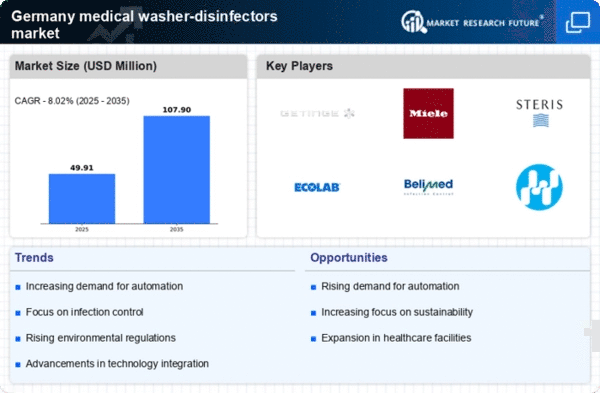The medical washer-disinfectors market in Germany exhibits a competitive landscape characterized by a blend of innovation, strategic partnerships, and a focus on sustainability. Key players such as Getinge (SE), Miele (DE), and STERIS (US) are at the forefront, each employing distinct strategies to enhance their market presence. Getinge (SE) emphasizes technological advancements in its product offerings, aiming to improve efficiency and compliance with stringent healthcare regulations. Miele (DE) focuses on high-quality manufacturing and customer service, positioning itself as a premium brand in the market. Meanwhile, STERIS (US) leverages its extensive global network to drive regional expansion and enhance its service capabilities, thereby shaping a competitive environment that is both dynamic and multifaceted.
The business tactics employed by these companies reflect a commitment to optimizing operations and enhancing customer satisfaction. Localizing manufacturing has become a prevalent strategy, allowing companies to reduce lead times and adapt products to meet local regulatory requirements. The market structure appears moderately fragmented, with several players competing for market share, yet the influence of major companies remains substantial. This collective presence fosters a competitive atmosphere where innovation and operational efficiency are paramount.
In October 2025, Getinge (SE) announced the launch of a new line of washer-disinfectors designed specifically for high-throughput environments, which is expected to significantly enhance workflow efficiency in hospitals. This strategic move underscores Getinge's commitment to addressing the evolving needs of healthcare facilities, particularly in terms of speed and reliability. The introduction of this product line may position Getinge favorably against competitors, as it aligns with the increasing demand for rapid and effective disinfection solutions.
In September 2025, Miele (DE) expanded its product portfolio by integrating advanced AI capabilities into its washer-disinfectors, enabling predictive maintenance and enhanced operational insights. This innovation not only improves the user experience but also aligns with the growing trend of digital transformation in healthcare. By adopting AI, Miele (DE) appears to be setting a new standard for operational excellence, potentially attracting a broader customer base seeking cutting-edge technology.
In August 2025, STERIS (US) entered into a strategic partnership with a leading healthcare technology firm to develop integrated solutions that combine washer-disinfectors with advanced monitoring systems. This collaboration is likely to enhance STERIS's service offerings, providing customers with comprehensive solutions that improve patient safety and operational efficiency. Such partnerships may become increasingly vital as the market shifts towards integrated healthcare solutions, reflecting a broader trend in the industry.
As of November 2025, the competitive trends in the medical washer-disinfectors market are increasingly defined by digitalization, sustainability, and the integration of AI technologies. Strategic alliances are shaping the landscape, enabling companies to leverage complementary strengths and enhance their market offerings. Looking ahead, competitive differentiation is expected to evolve, with a notable shift from price-based competition to a focus on innovation, technological advancements, and supply chain reliability. This transition suggests that companies that prioritize these elements will likely secure a more robust position in the market.



















Leave a Comment